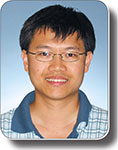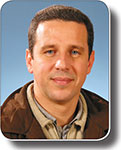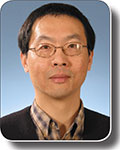Performance of swirl tube oil-water separator for downhole applications
Chong Yau Wong A , Mohamed Nabil Noui-Mehidi B and Jie Wu AA CSIRO Materials Science and Engineering
B Saudi Aramco
The APPEA Journal 49(1) 425-432 https://doi.org/10.1071/AJ08026
Published: 2009
Abstract
An experimental comparison is made between a 2 inch (50.8 mm internal diameter) liquid-liquid cylindrical cyclone (LLCC©) and a 2 inch CSIRO-patented liquid-liquid separator (CS-T). Flow visualisation by long-time exposure photography of the LLCC revealed a steady vortex core with a fixed orientation that is independent of the inlet watercut percentage. Visualisation of the CS-T revealed an inverted cone that varied with length at decreasing watercut at the inlet stream. Volume fraction studies showed that the CS-T separation characteristic is similar to the LLCC at the 50% split ratio, but this characteristic departs markedly at higher split ratios. For a watercut of 94%, the optimum split ratio for the present LLCC and CS-T are 55% and 58% respectively.

Chong Yau Wong obtained his mechanical engineering degree (Class I Honours) from the University of Adelaide, South Australia in 2000 and his Doctorate from the same institution in 2004. Since then, he has worked as a post-doctoral fellow specialising in laser diagnostics (particle image velocimetry and laser Doppler velocimetry) for two-phase flows at the University of Adelaide until 2006 and investigated the structure of turbulent boundary layer flows with PIV/Stereoscopic-PIV systems at Monash University until early 2008. He is currently with the CSIRO as an experimental scientist and laboratory mechanical engineer, working on several industrial projects involving multiphase separation technologies for the oil and gas industry and the industrial scale-up and separation of microalgae for bio-fuel production. He has published 30 papers on fundamental and applied fluid mechanics. chong.wong@csiro.au |

Mohamed Nabil Noui-Mehidi worked on this paper while employed by CSIRO Materials Science and Engineering. He is now employed by Saudi Aramco. Mohamed Nabil Noui-Mehidi is a petroleum engineer at the EXPEC Advanced Research Center (ARC) of Saudi Aramco Oil Company since joining in late 2008. He holds a PhD in resource and energy science from the University of Kobe, Japan. Between 2002 and 2008, he worked as a research scientist at the Thermo-Fluids group of the CSIRO-CMSE division where he led a project on subsea and downhole multiphase separation. His research activities are related to multiphase flows and development of new technologies devoted to upstream oil and gas production and he has published 60 papers in different aspects of fundamental and applied fluid dynamics. mohamed.nouimehidi@aramco.com |

Jie Wu graduated with a PhD from the mechanical engineering department of Monash University in 1994. He has been working as a research scientist for CSIRO in the area of multiphase flow dynamics. For the last 15 years, he has been leading a team of fluid dynamics specialists and mechanical/ chemical engineers conducting research and development for the Australian mineral processing industry, oil and gas industry and manufacturing industry. The research and development of the team scope typically includes developing a fundamental understanding for various fluid flow processes, providing flow improvement designs, developing innovative flow technologies to improve process efficiency, increase product quality or throughput, and to reduce operating costs. He has published at least 42 papers in international journals, 44 conferences papers and 84 technical reports and holds two patent applications. jie.wu@csiro.au |


